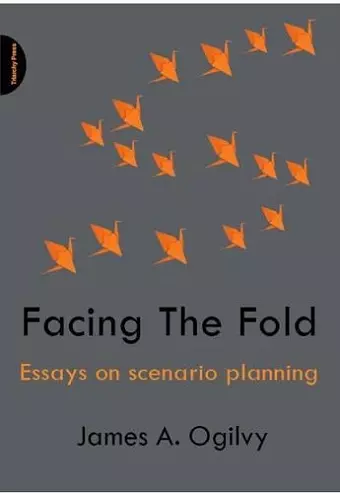Facing The Fold
Essays on Scenario Planning
Format:Paperback
Publisher:Triarchy Press
Published:28th Feb '11
Currently unavailable, our supplier has not provided us a restock date

How do we face the uncertainty and complexity of the future? An overly optimistic perspective can be motivating but easily dismissed as naive or shallow; the pessimistic outlook may be considered to be deeper and more 'knowing' but could lead to inaction. But limiting our visions of the future to simply one of these two 'branches' would mean adopting a position that is ultimately no more than a fatalistic rut. "Facing The Fold" is a collection of highly regarded journal essays about how scenario thinking uses the capacious space of the 'fold' to encourage thinking around alternative scenarios-to create the future we both want and need. Scenarios are not predictions, nor are they strategies. Scenarios are stories - narratives of alternative futures, designed to highlight the risks and opportunities involved in specific strategic issues. According to Ogilvy, scenario planning has generally been considered an art, but here he discusses the extent to which it can also be considered an integral part of 'the new sciences', especially complexity science. The narrative of scenario planning is of particular importance to complexity practitioners. Like complexity approaches, the advantage of scenarios is that they take into account the values and the contextual complexity surrounding the community and provide a way to reflect on the consequences of any strategy changes. The book is divided into 3 clear sections: Section I is about the 'nuts and bolts' of scenario planning and, as outlined in the first chapter co-authored with Peter Schwartz, the steps involved in the practice of developing scenarios, and the key considerations to ensure successful scenario planning. Section II situates scenario planning in the larger context of the human sciences of anthropology, psychology, literary criticism, philosophy and sociology. Section III offers a set of case studies-actual scenarios created for real projects. Lessons learnt from working in the public and the private sector are followed by two in-depth case studies on the future of higher education in California and K-12 public education in Seattle. The challenges and opportunities that were faced at the time are uncannily similar to current problems in the funding of education facilities around the world. Alternative scenarios to the momentum of increasing deficit and declining quality were developed at the time, and the author provides an...
Jay Ogilvy is all but unique among philosophers in that his work meets Marx's oft-quoted challenge of not only interpreting the world, but changing it. Facing the Fold is a luminous distillation of philosophical wisdom and modern management theory. A richer, more readable introduction to the theory and practice of scenario planning does not exist. Robert W. Fuller Author of All Rise: Somebodies, Nobodies, and the Politics of Dignity, Jay Ogilvy has for decades been an intrepid pioneer in the development of both the practice and theory of scenario planning. This wonderful collection of his writings is therefore a most welcome and valuable contribution to the field. Adam Kahane, Reos Partners and University of Oxford, author of Power and Love: A Theory and Practice of Social Change Ogilvy delivers a dramatic advance in scenario thinking, transforming scenarios from mere tools to vehicles for deep discovery in the face of uncertainty. Facing the Fold will change forever the way one thinks about the future and the possibilities it holds. Paul Saffo, Managing Director, Foresight Discern Analytics More than ever, we need to be able to think clearly about the future. I can think of no better practitioner and theorist than Jay Ogilvy. I have had the great pleasure and learning experience of participating in several scenario workshops led by Ogilvy over the years-mind-stretching experiences that proved to be prophetic in hindsight. Howard Rheingold, author of Smart Mobs and Virtual Communities I have been working with scenarios since they were first introduced in Shell forty years ago. While Pierre Wack was my scenario guru, the most thoughtful guide to thinking scenarically about the future has undoubtedly been Jay Ogilvy, who learned how to think at the feet of Hegel. Napier Collyns, GBN Cofounder and formerly a colleague of Pierre Wack's at Shell
ISBN: 9781908009227
Dimensions: 244mm x 170mm x 17mm
Weight: unknown
312 pages